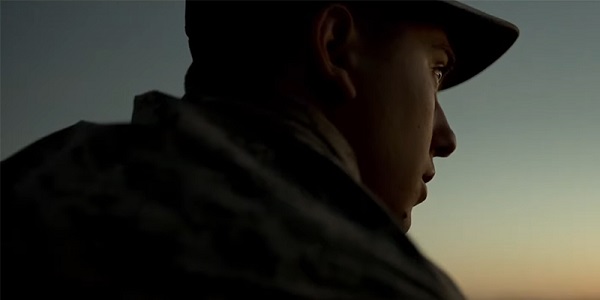This is Dan Strauss‘s second movie titled The Kill Team, following his 2013 documentary that focused on the same subject of the Maywand District murders during the War of Afghanistan, exploring the timeline from the harrowing personal perspective of Private Adam Winfield, one of four American soldiers who called themselves “The Kill Team”, who committed the murders of at least three Afghani civilians.
“We train our boys to be killing machines”
The contemporary relevance of The Kill Team lies in the themes of toxic masculinity, brush-stroke prejudices of “them” and military ethics, all of which are continually – rightfully – interrogated today, not least because of a leadership that stimulates such sentiments. At the time of writing, Trump, ever the reckless wordsmith, is under fire for unironically tweeting that, “We train our boys to be killing machines, then prosecute them when they kill”, in defense of another soldier on trial.

Making a fictional adaptation of the true story allows the filmmaker to apply his knowledge of the case and use his dramatist skill set to explore the events by closely re-enacting them. The reasons for this could vary: maybe making this feature is for business interests, taking a powerful story and putting big time actors front and centre to get more people to see it, or maybe Krauss believes that a technically proficient reenactment would be a much more accessible way of helping us understand the perturbing cause and effect of the case.
An outstanding lead performance
There’s even scope to dismiss it as unnecessary exploitation. But all of these are presuppositions – The Kill Team (2019) only really stands out for its superb acting. The strength of this war drama is almost entirely in Nat Wolff‘s performance as Adam, as Strauss filters the murders and bad behaviour (they were also disciplined for hashish) through Wolff‘s delicate reactions, to both avoid a crass recreation of the killing of innocents and attempt to delve psychologically into the emotional wounds that the war inflicted upon American military personnel.
The ever-reliable Alexander Skarsgård commands the sociopathic Deeks, the unpleasantly authoritarian leader of the Kill Team. Justifying a murder as “killing one of them saves ten of us”, his character is a fountain of reactionarism – anger, hatred, assumption – and his icy demeanor points to sociopathy. The latter is a character trait across all the members of the squad bar Adam, who’s the only one still attached to consciousness, reaching out to his father on Facebook as his outlet of releasing the truth outside the confines of the outpost.
The Kill Team: Conclusion
I don’t want to doubt the storytelling – Strauss knows better than me, of course – but the director’s closeness to his subject gives way to some creative choices that only seem designed to evoke as much sympathy from us as possible, losing the grit in favour of sentimentalism that feels like a cheap way of probing the subject’s individuality.
Ultimately, The Kill Team feels too close to a broad Hollywood product, despite the A24 logo hinting at something more radical and thought-provoking. It’s recommended for Nat Wolff completionists, but those interested in the story are better off viewing the director’s riveting, challenging documentary of the same name.
Have you seen the documentary? What did you think of it? Let us know in the comments below!
Watch The Kill Team
Does content like this matter to you?
Become a Member and support film journalism. Unlock access to all of Film Inquiry`s great articles. Join a community of like-minded readers who are passionate about cinema - get access to our private members Network, give back to independent filmmakers, and more.